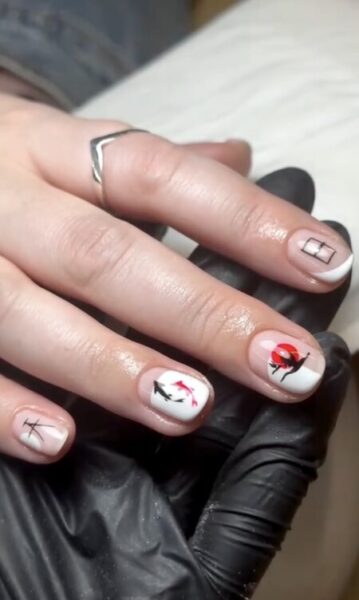
Imposter syndrome for nail techs: What it is & how to overcome it
By Lilly Delmage | 30 September 2024 | Expert Advice, Feature, Health & Wellbeing

Nail pros share their experiences with imposter syndrome and offer tips to help overcome it…
Have you ever felt undeserving or that success is beyond your means? Perhaps you’ve felt like your career journey has been down to luck, or you’re worried that clients won’t return. These are all common imposter syndrome thoughts, and if you’ve experienced these niggling beliefs – you aren’t alone.
In 2018, insurance company, AXA, found 24% of business owners reported suffering with these thoughts, which rose to a staggering 78% in 2022, according to personal finance company, NerdWallet. So, it’s likely you’ve come across the ‘imposter syndrome’ term, but what is it?
The main characteristic is the belief you will be ‘found out’ as a ‘fraud’ because you aren’t capable of the role you’re playing – largely a result of self-doubt and low confidence, with a risk of burnout when trying to prove yourself.

Signs, symptoms and triggers
Imposter syndrome can surface in various forms, but after asking Scratch’s Instagram followers, the responses highlighted the following as the most popular areas affecting beauty professionals:
Events
Glitterbels ambassador, Katie Turner (aka @_radiant_nails_) says: “I remember being asked to be a Glitterbels ambassador and thinking that I wasn’t in the right room. Seeing incredible nail techs and inspiring people around me made me feel like I wasn’t meant to be there.”
Louise Flowers, an OPI educator for North East England, shared a similar experience: “I attended The Scratch Stars Party with OPI in July, which was a dream come true. However, I spent the weeks running up to it feeling overwhelmed at the thought mixing with industry idols.”
However, when Louise did attend The Scratch Stars Party, she surprised herself: “I went, loved every second of the evening, and nothing bad happened!”
Nail art
“Sometimes, when clients show me inspiration photos of the art they want replicated, I have a mild panic,” admits Scotland-based nail pro, Amy McCall. “Recently, I said to a client ‘I don’t think I’ll be able to, but I can try’.”
Amy tried a Japanese-style design at her client’s request, and comments: “The finished nails looked much better than I thought they would, and they are my favourite set of nails to date!”

@amymccallnailartist’s completed Japanese-themed manicure.
Where has the rise in self-doubt come from?
Katie believes the answer lies in social media comparison, commenting: “We’re used to seeing the perfect nails, photos, salons and artwork on social media. No one talks about the hard days or challenges. You see work produced, and instantly compare it to your own before picking it apart.”
Constant comparison to ‘the best of the best’ on social media can prevent beauty professionals from pushing themselves out of their comfort zone, meaning they become their own barrier to success.
Impacts of imposter syndrome on nail businesses
Kent-based Calley Barham, a Glitterbels education ambassador, reveals: “I’ve been too scared to post a set of nails because I have seen a tiny flaw that might be picked up by potential clients. This has made me turn people away because I fear I won’t be good enough.”
Katie adds: “Imposter syndrome makes you feel as if you shouldn’t be pushing yourself to achieve things you want to achieve, because you haven’t got the skill to create what others have. I’ve stopped myself from entering a competition on so many occasions, due to the thought that my work wasn’t at the right level.”
Beauty professionals suffering with imposter syndrome are also often reluctant to increase their prices, devaluing their ability and jeopardising the growth of their business.

“In the past, I have charged very little for my work,” shares Katie. “This is because I had overwhelming feelings that I couldn’t charge the same as another tech locally, because in my eyes their work was at a different level, and they had been in the industry longer.”
Amy shares a similar experience, commenting: “I knew I needed to increase my prices, but I thought that my work wasn’t good enough for clients to pay more of their hard-earned money. I waited longer than I should have to finally do it, and was extremely nervous about it.”
Though, having finally increased her prices; Amy reveals the outcome: “I then became busier than ever!”
Take it from the techs
Do these experiences feel relatable? Nail techs offer their first-hand advice and reminders to help shift these limiting beliefs:
Calley advises: “Do not compare yourself to others on social media. Instead, use their posts as inspiration. Everyone is at a different stage of their nail journey, and yours is unique to you. The only comparison you should be making is of your own work against your last set, to ensure growth and progression.”
Katie comments: “Push yourself out your comfort zone into rooms you think you can’t be in, because you can! Show your personality and remember the qualities that make you an amazing nail tech.”
Read the article via Scratch‘s digital magazine here.

Read the latest issue









